What Essential Oils Are Safe for Cats
Curious about using essential oils around your furry feline friend? While these aromatic oils have many benefits for humans, it’s essential to understand if aromatherapy diffusers are safe for cats.
Explore the risks of exposing cats to essential oils, including skin irritation, respiratory problems, and even liver and kidney damage. Discover which essential oils are safe for cats and learn how to use them around your pet responsibly.
Keep your cat safe and healthy by reading on to learn more!
Key Takeaways:
What Are Essential Oils?
Essential oils are highly concentrated compounds extracted from plants that capture their aromatic and medicinal properties.
These oils are typically extracted through methods such as distillation or cold pressing, ensuring the potent essence of the plant is preserved. Widely used in natural health care, essential oils offer a range of benefits including stress relief, skin care, and even as natural household cleaners.
Derived from a variety of plants like lavender, peppermint, and tea tree, each oil boasts unique properties suited for different purposes. It’s important to note that due to their concentrated nature, essential oils should be used with caution, preferably diluted before applying topically to avoid skin irritation or adverse reactions.
Can Cats Be Exposed to Essential Oils?
Cats can be inadvertently exposed to essential oils through diffusers, cleaning sprays, hand sanitizers, and other fragranced products.
These exposure sources can lead to significant risks for your feline friends. When cats come into contact with essential oils, whether through diffused oil droplets in the air or direct ingestion by licking or grooming, they can experience adverse effects on their health.
Skin contact with undiluted essential oils is especially concerning as it may cause irritation, burns, or even toxicity depending on the type of oil. Inhaling concentrated oil vapors can affect a cat’s respiratory system and may lead to breathing difficulties. It’s crucial to be mindful of these dangers and prevent cats from accessing areas where essential oils are used or stored.
What Are the Dangers of Essential Oils for Cats?
The dangers of essential oils for cats lie in their toxic nature, posing risks to the health and well-being of feline companions.
When exposed to certain essential oils, cats can experience a range of adverse effects. Inhalation or skin contact with oils containing phenols, monoterpene hydrocarbons, or phenylpropanoids can lead to symptoms like drooling, vomiting, difficulty breathing, tremors, and even liver damage.
Cats lack the liver enzymes necessary to metabolize essential oils efficiently, making them more susceptible to toxicity. It’s crucial for cat owners to consult a veterinarian before using any essential oils around their pets, as even seemingly harmless oils like lavender or citrus can have harmful effects on cats.
Recognizing the signs of essential oil toxicity in cats is essential for prompt intervention and treatment. Immediate veterinary care should be sought if a cat shows any abnormal behaviors or symptoms after exposure to essential oils.
How Can Essential Oils Harm Cats?
Essential oils can harm cats through various means, including skin irritation, respiratory problems, liver, kidney damage, and neurological issues.
When cats come into contact with undiluted essential oils, the concentrated nature of these substances can lead to skin irritation, burning sensations, or even chemical burns. Cats have a heightened sensitivity to certain compounds in essential oils, which can trigger respiratory distress, manifesting as coughing, wheezing, or difficulty breathing. If ingested, some essential oils can cause severe internal organ damage, particularly affecting the liver and kidneys. It’s crucial for cat owners to be cautious when using essential oils around their feline companions, opting for pet-safe alternatives and always consulting with a veterinarian.
Skin Irritation
Skin irritation in cats due to essential oils can manifest as redness, itching, or discomfort on the affected areas.
Common symptoms of feline skin irritation caused by essential oils include excessive scratching, hair loss, inflammation, and in severe cases, skin lesions. When a cat comes into contact with an essential oil that irritates their skin, they may display behavioral changes such as restlessness or vocalization due to discomfort.
Specific essential oils that are known to cause skin irritation in cats include aromatherapy candles safe for cats, tea tree oil, citrus oils, peppermint oil, and cinnamon oil. These oils can disrupt the natural balance of a cat’s skin, leading to irritation and allergic reactions.
For treating feline skin irritation caused by essential oils, it is crucial to immediately wash the affected area with mild soap and water to remove the oil residue. Consulting with a veterinarian for further guidance and possible medication may be necessary to alleviate the symptoms and prevent complications.
Respiratory Problems
Respiratory problems in cats caused by essential oils can lead to symptoms such as coughing, wheezing, or difficulty breathing.
While essential oils have gained popularity for their various benefits, it’s crucial for cat owners to be aware of the potential dangers they pose to their feline companions’ respiratory health.
Signs of respiratory distress in cats include rapid breathing, shallow breaths, and even open-mouth breathing, indicating a serious underlying issue that requires immediate attention. Learn more about vanilla essential oils for cats.
Certain oils, such as tea tree oil, eucalyptus oil, and peppermint oil, can be particularly harmful to cats’ delicate respiratory systems, causing irritation, inflammation, and in severe cases, even toxicity.
Liver and Kidney Damage
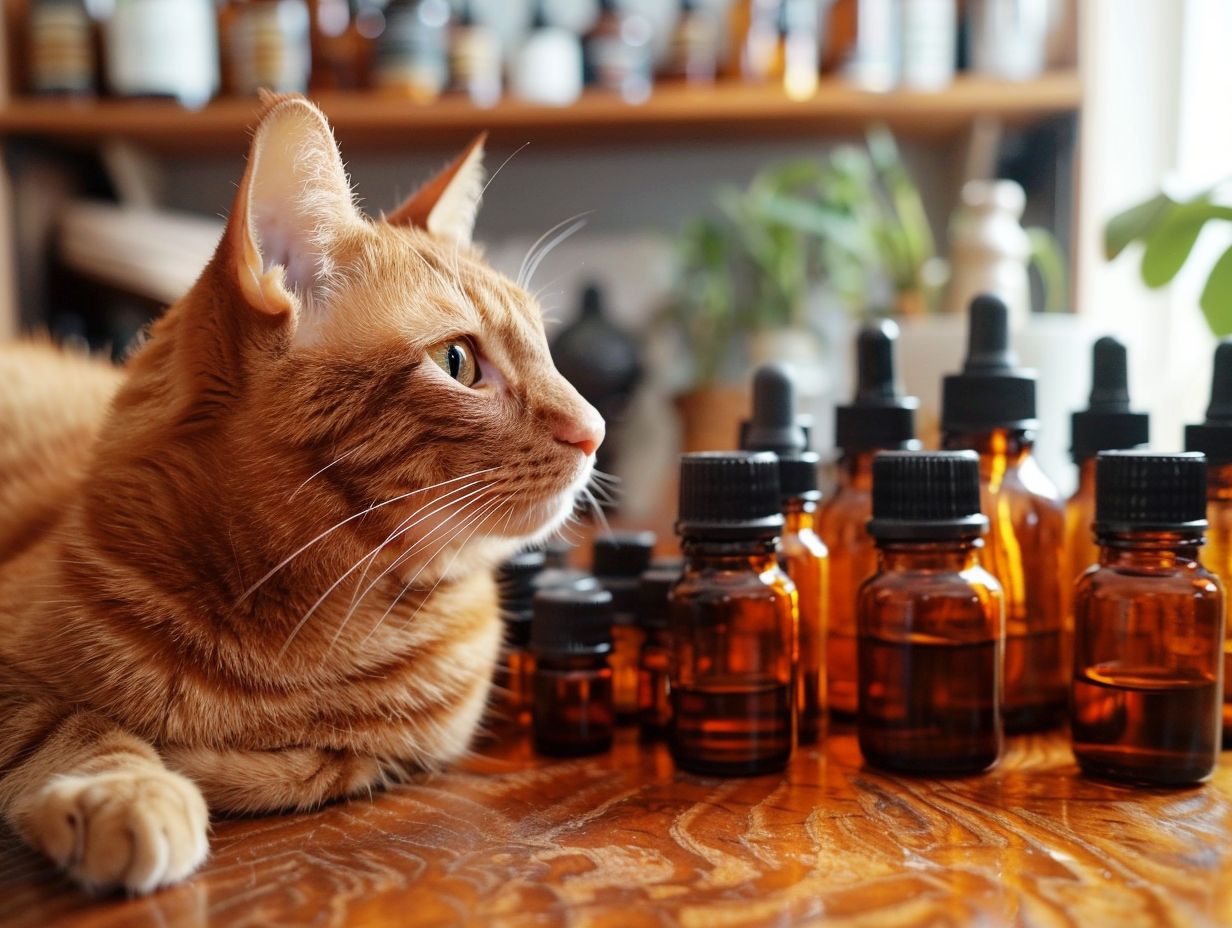
Essential oils can induce liver and kidney damage in cats, resulting in serious health issues and potential long-term complications.
Certain essential oils, while beneficial for humans, can pose a significant threat to a feline’s delicate system. Cats lack certain enzymes that help break down compounds found in essential oils, leading to accumulation and potential toxicity. It’s crucial for cat owners to exercise caution when using essential oils around their pets.
Oils like tea tree, peppermint, and citrus oils are known to be especially harmful to cats’ liver and kidneys, disrupting normal functions and causing harm. Early detection of symptoms, such as vomiting, lethargy, or loss of appetite, is key to preventing irreversible damage.
Neurological Issues
Neurological issues in cats stemming from essential oil exposure may present as symptoms like tremors, wobbliness, and low heart rate.
These symptoms are typically indicative of neurotoxicity, caused by certain essential oils. Lavender, Tea Tree, Citrus, Pine, and Peppermint oils are known to pose risks to feline nervous systems. When ingested or inhaled, these oils can disrupt a cat’s central nervous system, resulting in seizures, lethargy, and even respiratory distress.
- Veterinary care is crucial if you suspect your cat has been exposed to these oils.
- Early intervention can prevent further neurological damage and improve chances of a full recovery.
Which Essential Oils Are Safe for Cats?
While many essential oils are toxic to cats, some like lavender, frankincense, cedarwood, and chamomile are considered safe when used in diluted and controlled amounts.
These safe essential oils can offer various benefits to your feline friend when incorporated into their natural health care routine. When using these oils, it is crucial to ensure that they are properly diluted, as cats are more sensitive to essential oils compared to humans.
It’s recommended to dilute essential oils with a carrier oil such as coconut or olive oil at a ratio of 0.1-0.5% for cats. Always consult with a veterinarian before introducing any new essential oil to your cat, especially if they have underlying health conditions or are pregnant.
Lavender
Lavender is one of the essential oils often considered safe for cats due to its calming properties and mild nature when appropriately diluted.
When lavender oil is properly diluted, it can be used to promote a sense of calm and relaxation in cats, making it especially beneficial for anxious or stressed feline companions. The soothing aroma of lavender oil can help reduce stress, anxiety, and even aid in improving sleep quality in cats. It can also be used to alleviate minor skin irritations or insect bites when applied topically, offering a natural and gentle solution for common feline skin issues.
Frankincense
Frankincense is a cat-safe essential oil known for its anti-inflammatory and soothing properties, making it a popular choice for feline aromatherapy.
When used correctly, frankincense oil can help cats with various conditions such as arthritis, respiratory issues, and stress. The oil can be diffused in the air to promote relaxation or diluted and applied topically to soothe sore muscles and joints. It is important to remember that essential oils should be used sparingly and always diluted before application on cats to prevent any adverse reactions. Consulting with a veterinarian before using frankincense oil on your feline friend is highly recommended to ensure their safety and well-being.
Cedarwood
Cedarwood essential oil is considered safe for cats and is often used for its insect-repelling properties and grounding scent.
When applied topically, cedarwood oil can help deter fleas, ticks, and other pests that may bother your feline friend. Its calming aroma is also beneficial for cats who experience anxiety or stress, providing a soothing environment for them to relax in.
- It is important to note that cedarwood oil should always be diluted before use on or around cats. Direct application of undiluted oil can cause skin irritation or other adverse reactions.
- When diluting cedarwood oil for cats, a general rule of thumb is to use a ratio of 1 drop of essential oil to 10 drops of a carrier oil, such as coconut or olive oil.
Before using cedarwood oil around your cat, it is recommended to consult with a veterinarian to ensure it is safe for your specific feline companion, especially if they have any underlying health conditions.
Chamomile
Chamomile essential oil is gentle and safe for cats, known for its calming and anti-inflammatory effects that can benefit feline health and well-being.
When introduced appropriately, lavender aromatherapy can help to soothe anxious cats, making it a useful aid in managing behavior issues related to stress. Its natural sedative properties can promote relaxation and aid in sleep quality for your feline friend.
It is essential to dilute chamomile oil properly before use to prevent any adverse reactions in cats. A general guideline for safe dosages is to mix one drop of chamomile oil with five drops of a carrier oil, such as coconut or olive oil, and then apply it topically on your cat’s fur. Learn more about peppermint aromatherapy for cats.
Remember, it is always recommended to consult with a veterinarian before using any essential oils on your pets, including chamomile oil, to ensure the well-being and safety of your beloved feline companion.
How to Use Essential Oils Safely Around Cats?
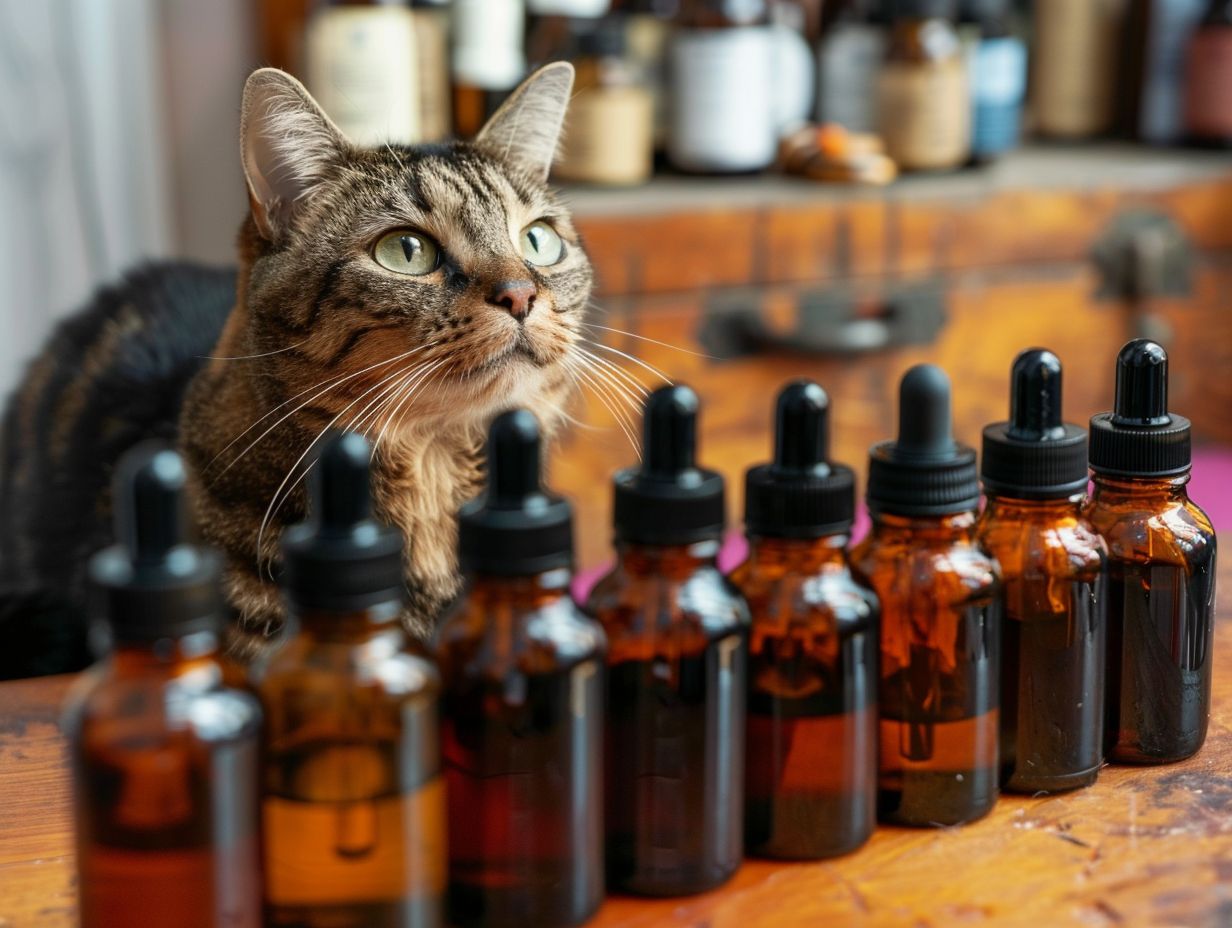
When diffusing essential oils, ensure that there is proper ventilation in the room, as cats are more sensitive to strong scents than humans. Monitoring your cat’s behavior during aromatherapy sessions is essential; if you notice any signs of discomfort or irritation, immediately cease use and seek veterinary advice.
Remember, cats groom themselves frequently, so even small amounts of undiluted essential oils left on their fur can be ingested, leading to potential toxicity. Prioritize your cat’s well-being by conducting thorough research on oils that are considered safe for cats, such as lavender, frankincense, and chamomile.
Diffusing
When diffusing essential oils around cats, ensure proper ventilation, use low concentrations, and provide an option for pets to leave the area if they show discomfort.
It is essential to understand the potential risks associated with diffusing essential oils in homes where cats reside. Cats lack certain enzymes in their liver, which can make them more sensitive to the concentrated compounds in essential oils. Opt for ultrasonic or nebulizing diffusers that disperse the oils in a fine mist rather than heat, as this reduces the risk of inhalation of undiluted oils.
- Choosing pet-safe essential oils is crucial; avoid oils containing phenol, thujone, or ketones, as these can be toxic to cats.
- Stick to diffusing oils like lavender, chamomile, or frankincense, which are generally considered safe for feline companions.
Topical Application
When applying essential oils topically on surfaces, ensure pets cannot directly access treated areas to prevent accidental ingestion or skin contact.
One crucial safety measure to bear in mind is to always dilute essential oils properly before applying them, as direct contact with concentrated oils can be too harsh for pets’ sensitive skin.
It is highly recommended to conduct a patch test on a small area of your skin first to rule out any adverse reactions before using safe cat aromatherapy oils on surfaces that your pets may come into contact with.
Storing essential oils securely in cabinets or high shelves inaccessible to curious pets can prevent potential accidents and keep your furry companions safe from any harm.
Cleaning Products
When using essential oils in cleaning products around cats, opt for non-toxic formulations, ensure proper ventilation, and keep pets away from freshly treated surfaces.
It’s crucial to store essential oils securely out of reach of curious paws to prevent accidental ingestion or spills. Consider using products with childproof caps or storing them in locked cabinets. When incorporating essential oils, dilute them properly using water or carrier oils to reduce their potency and potential harm to pets. Be mindful of the specific oils used as some can have adverse effects on feline companions. Consult a veterinarian if unsure about the safety of a particular oil.
What to Do If Your Cat Is Exposed to Essential Oils?
If your cat is exposed to essential oils, promptly remove them from the area, seek veterinary care, and closely monitor them for any symptoms of toxicity or discomfort.
Upon discovering that your furry friend has come into contact with essential oils, it’s crucial to act swiftly to minimize potential harm. First and foremost, ensure the cat is taken away from the source of exposure to prevent further absorption. Contact your veterinarian immediately for guidance on the next steps.
At this point, veterinary intervention becomes pivotal in determining the severity of the situation and providing the necessary treatment. While observing your cat, be on the lookout for signs such as vomiting, lethargy, drooling, or difficulty breathing, which could indicate an adverse reaction. Remember, quick action and professional help can make a significant difference in your cat’s well-being.
Remove Your Cat from the Area
If a cat is exposed to essential oils, immediately relocate them to a well-ventilated space away from the source of exposure to minimize further contact.
When a cat comes into contact with essential oils, their sensitive nature makes them more susceptible to adverse reactions, ranging from skin irritation to respiratory issues. The priority should be to create a safe haven for your feline friend, free from the lingering effects of the oils.
Quick action is crucial to prevent any escalation in symptoms. Take care to thoroughly clean any surfaces or items the cat may have touched to avoid secondary exposure. Learn essential oils safety for cats.
Adopting preventive measures can help ensure the well-being of your pet and minimize any potential risks associated with essential oil exposure.
Seek Veterinary Care
In cases of essential oil exposure, it is crucial to seek professional veterinary care promptly to assess the cat’s health, provide necessary treatments, and monitor for potential complications.
Consulting veterinarians following essential oil exposure in cats is vital because they can conduct thorough diagnostic procedures, such as blood tests and imaging scans, to evaluate the extent of toxicity. Based on the severity of the symptoms, treatment options may include supportive care, IV fluids, medication administration, and decontamination procedures. Post-exposure care protocols, like monitoring vital signs, hydration levels, and organ function, are essential to ensure the cat’s recovery. Seeking professional guidance in managing oil-related toxicity can significantly improve the chances of a successful outcome.
Monitor Your Cat for Symptoms
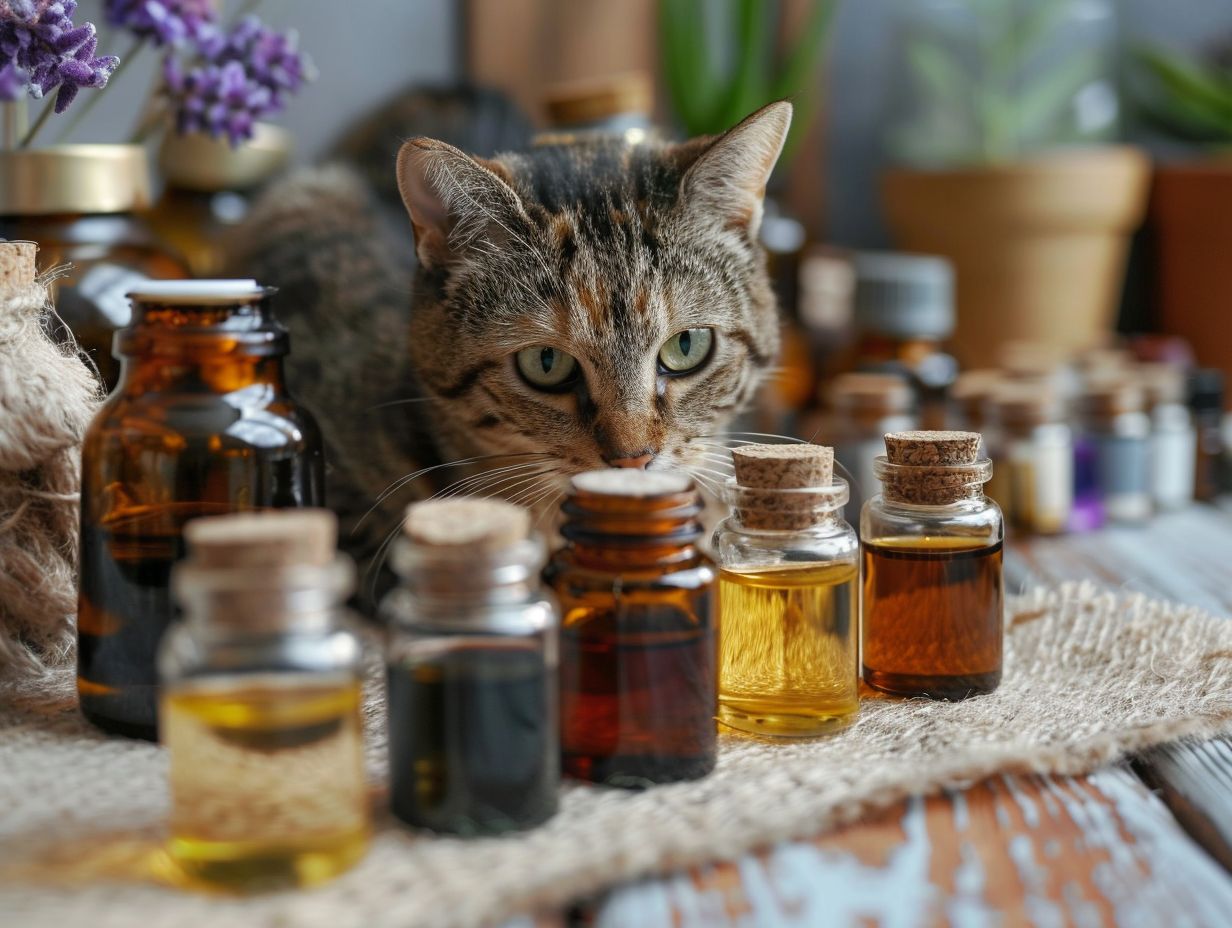
These symptoms may indicate your cat is experiencing essential oil toxicity, which can range from mild discomfort to severe neurological effects. Timely intervention is crucial in such cases to prevent long-term damage or even fatalities. Remember, some essential oils are more toxic to cats, such as tea tree oil or peppermint oil, so be extra cautious. Even small amounts can pose a risk, so always store essential oils securely out of your cat’s reach. Regularly checking your feline friend for any unusual behavior or symptoms can help catch any issues early, ensuring prompt treatment and better chances of recovery.
Frequently Asked Questions
What Essential Oils Are Safe for Cats?
There are several essential oils that are considered to be safe for cats, including lavender, chamomile, and frankincense.
Can I use any essential oil on my cat?
No, not all essential oils are safe for cats. Some oils, such as tea tree and peppermint, can be toxic to cats and should be avoided.
How can I tell if an essential oil is safe for my cat?
Always do your research and consult with a veterinarian before using any essential oil on your cat. Look for oils that are specifically labeled as safe for cats or that have been recommended by a trusted source.
Are there any specific ways to use essential oils on cats?
It’s important to never apply essential oils directly to your cat’s fur or skin. Instead, you can diffuse the oils in a well-ventilated room or create a diluted spray to apply to their bedding or favorite spots.
What are some benefits of using essential oils on cats?
Some essential oils can have calming effects on cats and may help with anxiety, stress, or even certain health issues. They can also be used to freshen up a room or help with odor control.
What should I do if my cat has a negative reaction to an essential oil?
If your cat shows any signs of discomfort or distress after being exposed to an essential oil, stop using it immediately and seek guidance from a veterinarian. Some cats may have sensitivities or allergies to certain oils, so it’s best to err on the side of caution.

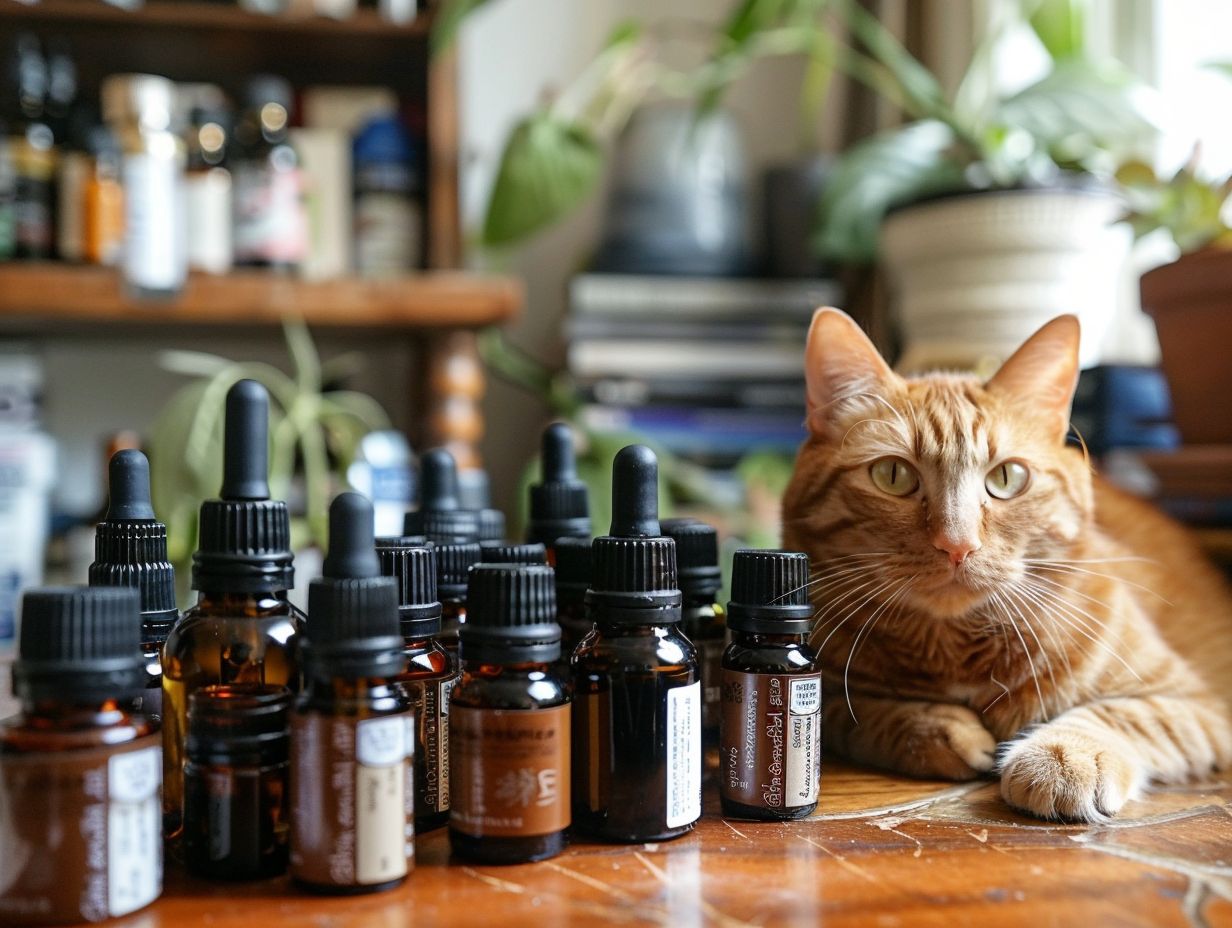
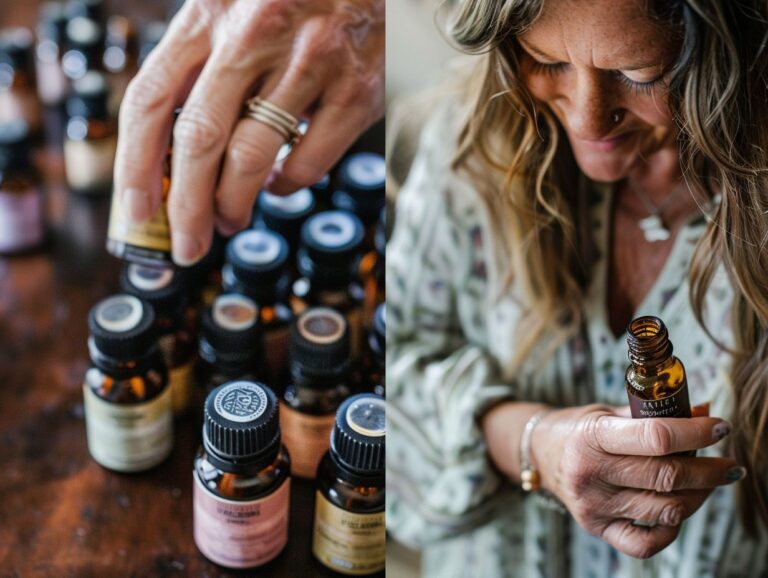
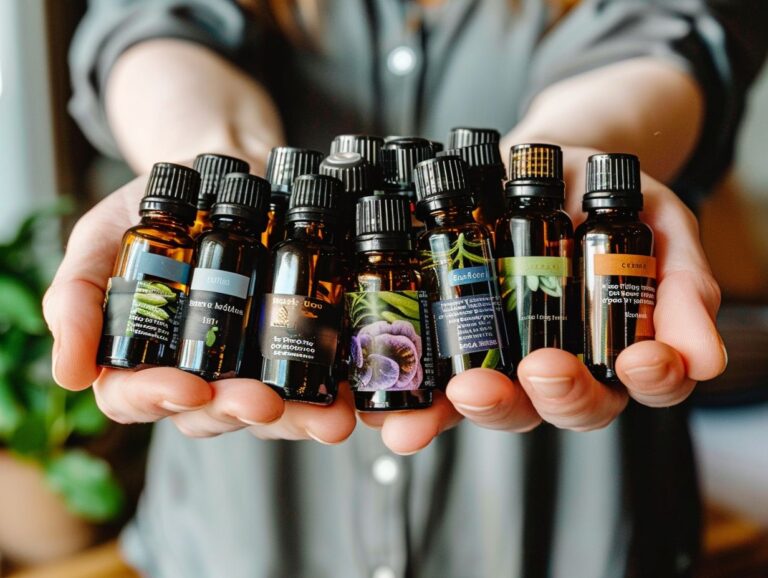




2 Comments